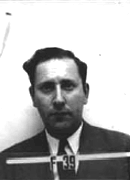Robert Marshak was an American physicist.
Marshak was born in 1916 in New York City. He received a B.A. from Columbia University and a Ph.D. in physics from Cornell University, where his thesis advisor was Hans Bethe.
During World War II, Marshak worked on the Manhattan Project at Los Alamos, where he served as a deputy group leader. Marshak’s work at Los Alamos included research on the behavior of shock waves in the high temperatures of a nuclear explosion, a phenomenon known today as “Marshak waves.” A pacifist at heart, Marshak joined the Federation of Atomic Scientists following the bombings of Hiroshima and Nagasaki and would go on to serve as its chairman.
After the war, Marshak embarked on a lifelong career in education. He was a professor of physics at the University of Rochester until 1970, when he left to become president of the City University of New York. He would also go on to teach at the Virginia Polytechnic Institute. During his career, Marshak received many honors, including the Ford Fellowship, Fulbright Fellowship, and the Guggenheim Fellowship three times.
Marshak also held a strong interest in international cooperation through science. He was part of a delegation of six scientists which visited the Soviet Union in 1956, and made many other trips across Europe, Asia, and the Middle East. Marshak also established the Rochester Conference (today known as the International Conference on High Energy Physics), and negotiated with the State Department to include Eastern European and Soviet scientists.
Marshak died on December 23, 1992, in Cancun, Mexico.





